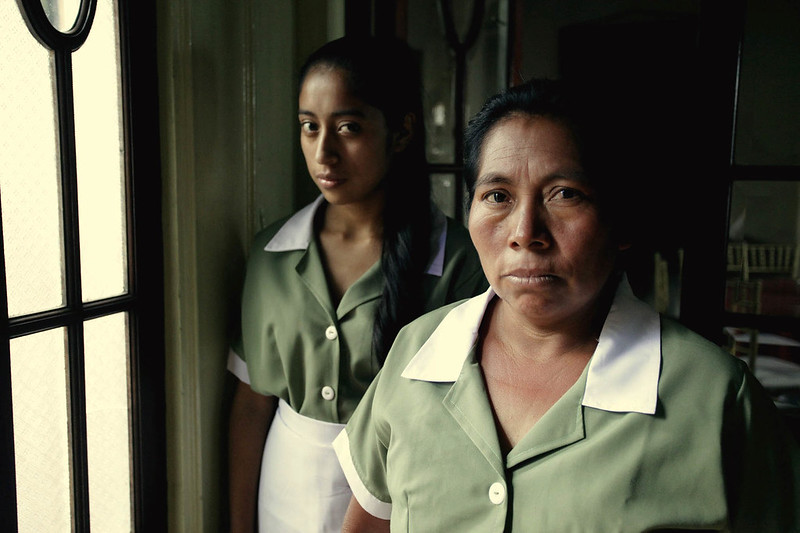Premiering under Sundance’s “Spotlight” selection (after previously making its way to the Venice and Toronto film festivals), is Jayro Bustamante’s “La Llorona,” a slow-burn horror movie that grapples with genocide in the director’s country of Guatemala, and a need for justice. It’s worth noting from the pitch that this isn’t the type of horror movie in which there’s a threat of a jack-in-the-box jump scare, or a disturbing monster waiting in the midst. Instead, it’s a vengeful spirit that gives the film its name, and the anger within “La Llorona” makes for a solemn and gripping tribute to real-life atrocities.
“La Llorona” starts with a focus on a family of bad people, namely that of a general named Enrique (Julio Diaz), his wife, his daughter, and the general’s granddaughter, Sara (Ayla-Elea Hurtado). In the film’s opening moments, the general is awoken from his sleep by the sound of a woman crying. In the darkness, he grabs his gun, and walks through his dark house. The cries continue, until he almost shoots his wife on accident, after she appears behind him and startles him.
Seconds later, we see the general in court. He has been accused of ordering genocide against the Mayan-Ixil people in 1981, a real atrocity related to the Guatemalan Civil War. In one of Bustamante’s many engrossing, very slow zooms out of someone’s close-up, a woman details the horrific events as just one of the people who was terrorized by Enrique’s actions. Meanwhile, a whole courtroom of people sit listening, flashing bulbs, acutely presenting a massive public scandal. Bustamante keeps the attention on the humanity, but creates a precise slow-burn with the visual style, a key aesthetic value evident throughout this impassioned, confident horror film.
The general is found guilty until he’s then acquitted, and free to retreat back to his home in the city. But protesters remain outside of the gates, with pictures of their loved ones, singing songs. They are constantly heard in the background, especially when the house doors open to welcome a new maid named Alma (Maria Mercedes Coroy, previous of Bustamante’s also quietly gripping “Ixcanul”), who is meant to assist the only other maid there, Valeriana (Maria Telon). The heavy sobs return again, causing Enrique to cautiously walk through the house at night, in search of sounds that are haunting him and nobody else.
In one of Bustamante’s most compelling narrative ambitions, the terror in the story involves following people that we would naturally want the worst for. And yet they are not simply villainous, even if the general’s family members have benefited from his power in the past. In a tricky balance that Bustamante pulls off, they become the surrogates for the unease that Bustamante conjures with mysterious things happening at night, though the story is not about them being killed off one by one.
Bustamante previously conjured a searing moment of chaos in his film “Ixcanul,” in which an indigenous family sought desperate medical help in the bracing chaos of a bustling city at night. “La Llorona” contains some of that same tension between Indigenous people and those who have wronged them, and it adds to the movie’s searing quality. It walks a fine line of being almost too sullen, with its many morose performances, but that goes toward creating this thick atmosphere of grief, with the general and his family surrounded by it. The film’s most gripping visual does not come from something that’s frightening but instead powerful, in a way befitting Bustamante’s bold vision for political horror: all of the protesters outside the general’s home, standing in silence, looking straight up him, if not through him.

The only Midnight movie that isn’t a world premiere this year is Joko Anwar’s “Impetigore,” and that’s for a good reason. Anwar’s previous film “Satan’s Slaves” became the top grossing Indonesian film of 2017 with its thrills on level of “The Conjuring,” and proved that any horror project he makes is worthy of attention. But “Impetigore,” again using some ideas of generational trauma and infertility, is a clumsy bit of black magic horror only book-ended by freaky greatness.
“Impetigore” boasts an incredible opening sequence based on the monotony of being a toll booth operator and the terror of being trapped inside. Anwar swiftly moves between comedy and horror, as Maya (Tara Basro) banters with her friend Dini (Marissa Anita) about her being stalked by this weird guy. Moments later, the guy drives past Maya’s booth, he then gets out, takes a machete, and starts walking toward her (Anwar could make a killer Jason Voorhees movie). The sequence is like its own short film, and it provides a strong atmosphere where the unsettling and silly both feel of the same fabric.
The machete man doesn’t kill Maya, but his blade does make Maya aware of a tiny scroll in her leg. “Impetigore” then sets off on a “foreigner in a creepy village” tale of black magic that has visual nods to “Texas Chain Saw Massacre” and “Hostel 2.” Her curiosity sends her to the secluded village of Harjosari, where her family has an abandoned home that she thinks she can sell and make money from, despite being estranged from her family for years. With the repartee she has with her friend Dini, “Impetigore” proceeds as an ominous but funny journey down into whatever awful thing awaits.
Anwar makes a big change midway through and it feels wasteful, making way for a story that then becomes sporadically gruesome but is not nearly enough fun (until the final shot, at least). He has an ambition to supplant the modern day thrills with an extensive, disturbing backstory related to a village curse, but it’s dumped into the story in such a clunky way that it becomes almost laughable. Even worse, Anwar’s script conjures a curse for his characters that is mostly confusing, weakening the movie’s threat of terror in a setting that fails to be as scary, even with its multitude of child graves or the sinister presence of village master Ki Saptadi (Ario Bayu). Not even indulgent bouts of skinless bodies can save “Impetigore” from being the dull mess it reveals itself to be.












